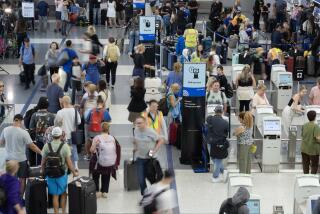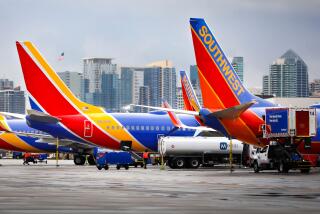Family Sues Northwest Air Over Christmas Day Delays
A San Marino family is suing Northwest Airlines Corp. for Grinch-like behavior, charging that the company destroyed Christmas last year by holding them prisoner on the tarmac of a Southern California airport.
Jeffrey Sheldon, his wife and two teenage daughters claim that they were for more than seven hours Dec. 25, 2000, after bad weather in Los Angeles caused Northwest to divert the flight from Honolulu to Ontario International Airport.
They charge they suffered severe emotional distress, humiliation and mental anguish--claims the Eagan, Minn.-based airline disputes.
“We’re going to be asking for millions of dollars in punitive damages,” said Joseph Lisoni, a lawyer for the family.
The Sheldons initially asked the airline for about $5,000 compensation, before filing their case in San Bernardino County Superior Court in October.
At a news conference Thursday, the Sheldons and their lawyers complained that Northwest, which handled 58 million passengers last year, was blatantly unprepared to handle the diversion and that the airline prevented the family from getting off the plane between 1 a.m. and sometime after 7 a.m. on Christmas.
“It was claustrophobic,” said Pamela Sheldon.
“If Santa Claus was on that plane, he would have missed Christmas,” Lisoni said. “They were not given food. There was no Christmas music piped in to them over the system.”
Northwest Airlines said the delay lasted only four hours. Initially, the crew intended to hold until fog cleared in Los Angeles, said Kathleen Peach, a Northwest spokeswoman.
When the crew realized the weather wasn’t going to improve, it began plans to let people off the plane, but there was further delay because the airport lacked the necessary equipment for the large DC-10, which Northwest didn’t regularly fly into Ontario, she said.
Northwest sent each passenger a letter of apology from its chief executive as well as vouchers ranging between $25 and $100. In addition, it reimbursed the Sheldons for a car rental and extra parking charges, Peach said.
Last April, Northwest agreed to pay $7.2 million to 3,700 passengers trapped on 30 planes in Detroit during a blizzard in January 1999. Planes ran out of food and water and toilets overflowed as travelers sat in their seats on the tarmac for hours.
But Northwest said the circumstances in Detroit nearly a year earlier were very different.
“That was a much more egregious situation,” Peach said.
The average $1,300 payment made to each passenger trapped in Detroit is not a new standard travelers can expect for every delay, she said.
Sheldon, a patent lawyer who flies frequently, said his family’s case should not be thought of as trivial in light of the recent losses families have suffered from terrorism in the skies. People are willing to cut airlines slack for extraordinary circumstances, but not for events within their control, he said.
“I don’t think you can use Sept. 11 as an excuse for bad customer service,” he said.
More to Read
Inside the business of entertainment
The Wide Shot brings you news, analysis and insights on everything from streaming wars to production — and what it all means for the future.
You may occasionally receive promotional content from the Los Angeles Times.










